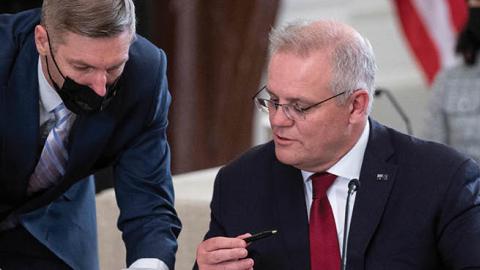International summits almost inevitably end in grandiose joint communiqués, most of which are quickly forgotten. This month’s announcement of the Aukus partnership by President Biden, British Prime Minister Boris Johnson and Australian Prime Minister Scott Morrison won’t be. This isn’t because the pact made France unhappy or even because it highlights America’s long-term commitment to the Indo-Pacific. Aukus is a deep but flexible partnership between leading tech powers that could shape the 21st century and serve as the model for U.S. alliances in the Indo-Pacific.
The impetus for the agreement, Prime Minister Morrison told me in an interview during his recent trip to Washington, came from the Australians. After years of escalating pressure, last November Chinese diplomats in Canberra warned that to enjoy better relations with Beijing, Australia’s government must address 14 Chinese grievances. It must, among other things, stop funding “anti-China” research, refrain from provocative actions like requesting a more thorough World Health Organization investigation of the origins of Covid-19, stop opposing strategic Chinese investments into Australia, and block private media outlets from publishing “unfriendly” news stories about China.
Meanwhile, the size and speed of China’s naval buildup had forced Australian defense planners to rethink their national defense strategy. One casualty of that review was confidence in Australia’s strategic partnership with France which was anchored by the now-cancelled submarine program. Faced with a relentless and rising China, the Australians concluded that only closer ties to the U.S. could provide the deterrence and protection they need.
Read the full article in the Wall Street Journal

















